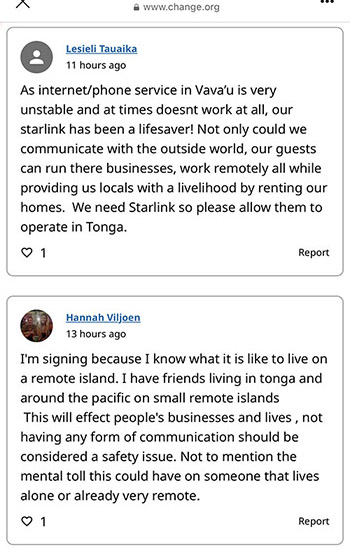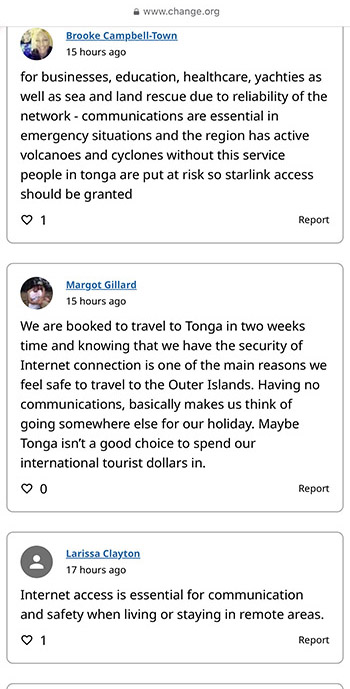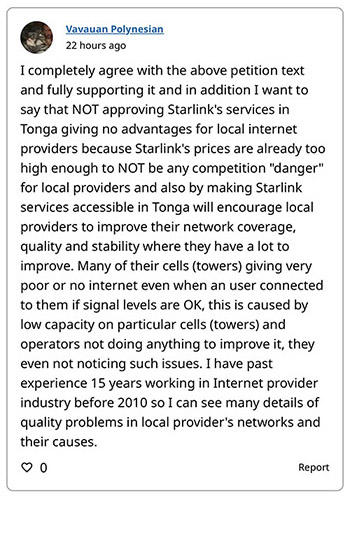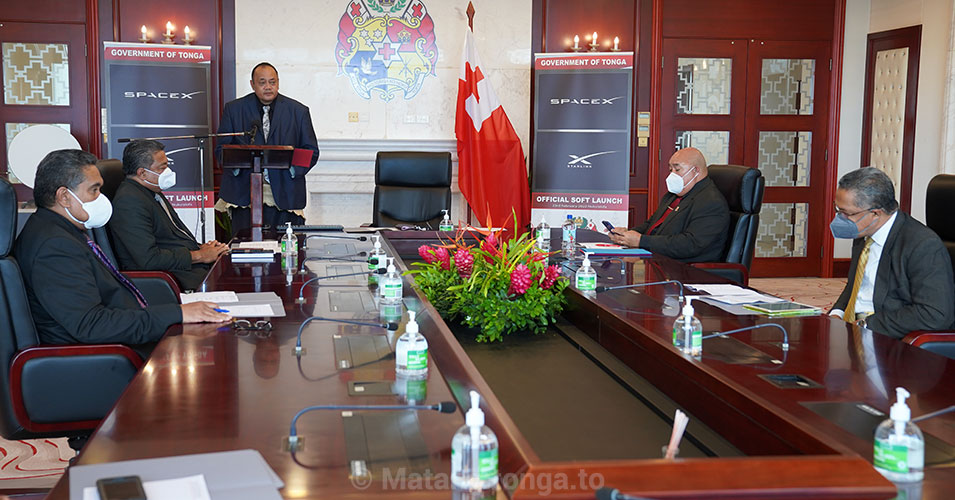
By Mary Lyn Fonua
Yesterday, Starlink notified its roaming customers located in Tonga that they have been directed by the Tonga government to disable Starlink internet services to users in the country.
The 10 July notification shocked internet users, especially those who have turned to Starlink's high-speed roaming service as a life-saver, after the domestic submarine cable failed for the third time a fortnight ago, following an earthquake.
Concerned users are raising a petition to the Tonga Government “to Allow Access to Starlink Internet Services in Tonga” which has already attracted over 300 signatures.
Yesterday, the Starlink service was still working in Tonga, offering its customers a chance to pause the service and, possibly, claim a refund for unused periods. But in issuing the notification, no-reply [at] starlink [dot] com did not state a time when the plug will be pulled.
A resort owner in Ha'apai, Darren Rice, who is totally reliant on the satellite service said, “When Starlink goes off, without the internet we can't call for help, we don't know when storms are coming, we don't know if there is a tsunami warning, we can't call the hospital or the fire engine.”
Local providers are offering a low bandwidth, limited satellite service and they are working to improve that over the next few weeks, but at the moment it's not enough to support the demand. The cable repair date is unknown. Local telephone services are unstable and it's hard to get information from Ha'apai and other affected locations.
People in Vava‘u told Matangi Tonga that the ATM situation is also bad, because there are only two ATM machines (BSP) in Vava'u and at the moment they don't work because of the slow internet.
Cable cuts
Starlink is a satellite internet constellation operated by Starlink Services, LLC, a subsidiary of American aerospace company SpaceX, providing coverage to 80 countries. It also aims to provide global mobile broadband. SpaceX started launching Starlink satellites in 2019.
Starlink became important in Tonga, when large parts of the domestic cable were destroyed during the Hunga-Tonga Hunga-Ha'apai eruption in January 2022 and it took 18 months for the cable to be repaired.
It's estimated there are now hundreds of Starlink users in Tonga, but no one knows for sure, as the uncapped data limit means that neighbours can share high-speed services, so one subscription can service many people.
“Starlink is the best thing that ever happened,” said Darren, who has lived at Faleloa for 15 years, an isolated location, where he and his wife Nina own and operate the Matafonua Island Lodge. He was fearful yesterday, when he received the Starlink notice of MEIDECC's directive to stop the service.
“If they turn-off Starlink it will put us out of business,” he said. “It will throw us back to the dark ages. Why are they punishing us?”
“We need the internet. Our landlines have never worked properly in the 15 years we've been here.”
Most people agree that it is very hard to run a business in isolated locations in Tonga.
Now, with the domestic cable out, Darren said there are no telephones and no cell phones in Ha'apai and the limited bandwidth offered by the local service providers this month are not cutting it. “The phone rings but there's nobody there!”
When the internet services go down, guests cannot book rooms.
“Even if they manage to arrive at the airport – we won't know what time they are arriving and they can't call us to pick them up. We can't call the airline to check the times of flights, which are constantly changing.”
But Darren’s main concern yesterday was “safety”, because after Starlink stops its service, without the internet on the beach, they will be blind and out of touch with the world.
He can't understand why the government has not approved Starlink's application for registration in Tonga.
The notification stated that Starlink is still trying to get regulatory approvals in Tonga.
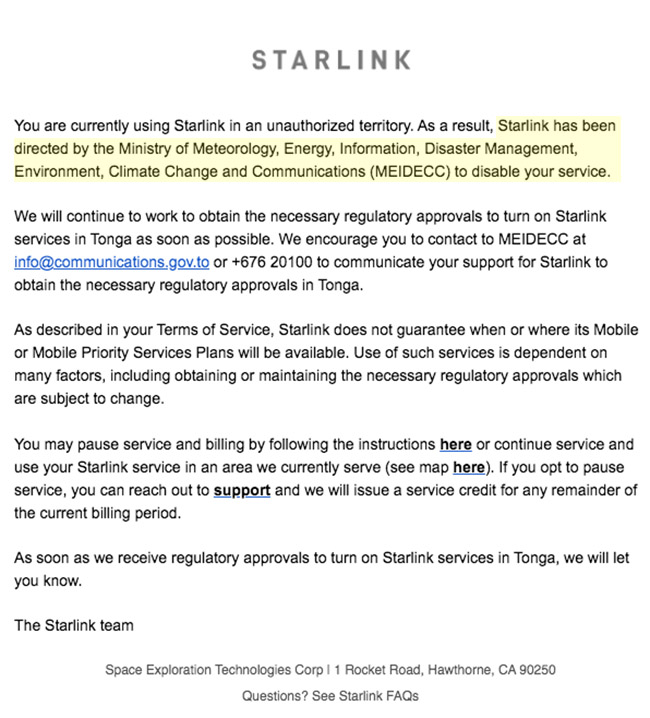
Roaming packages
Local users and visitors bring the small Starlink terminals from overseas, on roaming packages, mostly from Australia and New Zealand, that technically, can work anywhere in the world that has a line of sight to Starlink satellites. It's considered a "disruptive" technology that bypasses centralized authority and in Tonga its high-speed and uncapped data packages are competing with the government-owned communications services.
Tonga has never accepted Starlink's pending application for registration, while over the last two years the Starlink uptake of “roaming” subscribers located in Tonga has increased substantially, not only on the outer islands, but also on Tongatapu.
It's not just private users who seek the service, some major institutions and large businesses are using Starlink.
After the HTHH eruption plunged Tonga into digital darkness SpaceX cofounder Elon Musk sent 50 VSAT terminals to Tonga – even the Prime Minister had one in his office and at the time he said they were “strategically installed on all island groups”.
Nonetheless, when the PM, Hon. Hu'akavameiliku said on 9 May this year that he was considering issuing Starlink a licence to offer broadband internet services in Tonga, he also asserted: "It is illegal for anyone to use Starlink services in Tonga, because they are not a registered provider in Tonga."
He said they also had to weigh the impacts on network operators in Tonga
Since then, no decision has been forthcoming from the Prime Minister's Office to the public.
Regulators
Yesterday, Matangi Tonga Online reached out to the regulator, the Acting director of Communications, Stan 'Ahio, but did not receive a response.
We wanted to ask him:
- How is his Ministry communicating with their Vava'u and Ha'apai offices at the moment?
- Was MEIDECC's directive to Starlink “to disable its services for Tonga” made before or after the domestic cable blacked out on 29 June?
- What is the rationale for that directive that since the PM told the public he was considering Starlink's application?
- Has the Cabinet made a decision and issued a directive to MEIDECC to block Starlink during the domestic cable blackout?
Demand
There's no doubt that satellite internet services are in demand in Tonga.
Take a quick look around Nuku'alofa and it's not hard to find empty Starlink packaging boxes in offices, where terminals are discreetly placed at the rear of buildings.
“We want reliable internet services that work,” said Taiatu 'Ata'ata, a Nuku'alofa businesswoman, who has an interest in technology.
“If it can't be provided by local operators then we will go elsewhere,” she said yesterday after reading the Starlink notification.
“The government should be more enabling for the private sector to fully operate. Are they trying to kill off all the local businesses or what? The environment is very tough. Here we are, struggling, and now they are stifling our internet!”
In Tongatapu yesterday, various businesses who started using Starlink, said they also used the local services. They said the local services were: “poor”, “unreliable”, “slow”, “way too expensive”, “capped, throttled” and “doesn't work.”
“It's difficult to do business in Tonga. We deserve better,” said one.
But most who are using Starlink did not want to go on the record after the Prime Minister's Office called the roaming service "illegal".
“Given the poor local service this is a poor decision, even more so for outer islands,” said one local observer yesterday.
Local communications services
Yesterday, Matangi Tonga's reporter, Katalina Siasau, tried calling tourism operators in Ha'apai who are using local telephone services.
“I spoke with the manager of the Reef Resort in Vava'u, Herwig Haunschmid. He was using a UCall number, the connection was bad, I could barely hear him. He sounded upset about the situation. He said that communication, especially the internet, is very bad. He said it's hard to communicate. He mentioned credit cards, airlines, and Starlink, but I had to ask him to repeat what he was saying and I still couldn't get a full sentence without the line cutting,” she said.
With the Vava'u local services we could connect with the TCC landlines, but not very clearly. Digicel services seemed to be alright for telephone calls to family in Vava'u.
On Sunday, 30 June, Digicel was able to get their backup satellite services working in Vava’u, which give them ability to switch on voice, SMS, and data services, however, not in the same capacity as they normally had. They had done the same for Ha'apai on Tuesday, 2 July. Digicel planned to dispatch a couple of teams to bring on a microwave terrestrial link to Vavau, using satellite to bring capacity to normal, but said it would take two weeks.
TCC CEO Sione Veikoso said they had done restoration for mobile voices, data, and sms to Vava'u on Monday, 1 July, and Ha'apai on Tuesday, 2 July, using their backup satelite link but the bandwidth is low, therefore the services speed was not as effective. He said they had put up free public wifi at the TCC headquarters office in Neiafu, Vava'u, as well as their office in Ha'apai.
Forum meeting
Tonga will host the Pacific Islands Forum Leaders meeting at the end of August. Over a thousand incoming delegates, support staff and visiting news crews will be demanding high speed internet within a small window of time. High level delegates expected include the UN Secretary General, the Commonwealth Secretary General and leaders of Pacific Island countries. If they can find accommodation, some of them will be expecting to bring their own Starlink terminals to ensure they have communications. News crews struggle at the best of time to upload packages out of Tonga using the local internet, and it will be worse when that problem is multiplied by so many users in August.
Yachts hit reefs
A visitor on a yacht in Neiafu, Bill Hay (Whiskey Romeo Hotel), told Matangi Tonga that he had written to the Minister of Communications today, to ask him to consider not banning Starlink on yachts.
“A reliable internet connection is very necessary for overseas yachts to be able to navigate around the various reefs of Tonga. The paper charts and the electronic charts are not always accurate,” he said.
“We are on a rally from New Zealand with various other boats and already two yachts have hit reefs. One was able to be freed but the other sank, so for everone’s safety we need a reliable internet connection to navigate safely.
Bill said he bought a Digicel SIM card to use in Tonga but Digicel has been down lately. “I need to have a reliable internet connection so I can plan my sailing safely. There are also parts of Vava’u where I have had no Digicel connection. I feel that having Starlink available on my boat makes it safer for me and my crew,” he said.
Petition to government
Meanwhile, a “Petition to Allow Access to Starlink Internet Services in Tonga” was posted on www.change.org on 10 July and is being sent to MEIDECC and Tongan Cabinet ministers.
The ‘Tonga Expats and Locals’, a public group that has 11.0k members on Facebook, posted support for the petition stressing “the safety aspects of not having stable telecommunications, especially in the outer islands as a result of the fibre damage.”
Here's what the petitioners have to say:



